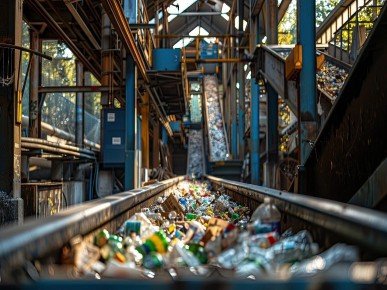
Recycling glass is a crucial part of eco-friendly waste management techniques. The procedure lessens its influence on the environment while also conserving resources. Glass recycling helps promote a circular economy, which reduces waste and the need for new raw materials by repurposing products.
How is Glass Recycled?
There are multiple crucial processes in the recycling of glass. Glass waste that has been gathered is first sorted by kind and colour. Because different kinds and hues of glass have varied chemical compositions and melting points, sorting is essential. Following sorting, the glass is cleaned to get rid of any residue, labels and caps. Cullet or tiny shards of broken glass are created by crushing the cleaned glass. The molten glass from this cullet is then moulded into new goods after being melted at a high temperature in a furnace. When cullet is recycled instead of glass made from raw materials, energy use and emissions are drastically decreased.
The Advantages of Recycling Glass
Recycling glass has many advantages. Recycled glass lessens the demand for raw materials including sand, soda ash and limestone, which contributes to resource conservation. Furthermore, cullet production of new glass uses less energy than using raw materials, therefore recycling glass also saves energy. A healthier environment is also produced by the recycling process, which lowers greenhouse gas emissions.
Best Practices for Glass waste management
In order to effectively manage glass waste, both individual and community initiatives are needed. The following are some recommended procedures:
1. Distinguish Glass Waste: To make recycling easier, be sure to segregate glass debris from other kinds of waste.
2. Clean and Rinse: To get rid of food residue and labels, rinse out bottles and jars before recycling.
3. Use Recycling containers: For optimal processing, place glass waste in the appropriate recycling containers.
4. Encourage Local Programs: Take part in recycling initiatives in your community and adhere to regulations that encourage recycling glass and trash reduction.
Solutions and challenges
Glass recycling has advantages, but it also has drawbacks. Glass that has been contaminated with other materials may make recycling more difficult. Moreover, not every area has easily accessible glass recycling facilities. It's essential to invest in better recycling infrastructure and to educate the public about safe glass disposal in order to overcome these problems.
To sum up
Waste management and glass recycling are essential to the sustainability of the environment. We can all contribute to a more effective and environmentally responsible waste management system by being aware of the glass recycling process and following best practices. Taking up these practices has a big impact on our communities by reducing environmental impact and conserving resources.
By managing your glass waste employing us, you're contributing to a sustainable future as well as a cleaner environment. Together, let's end glass waste and make the world a happier, greener place. Contact us right now to learn more about our glass recycling services.